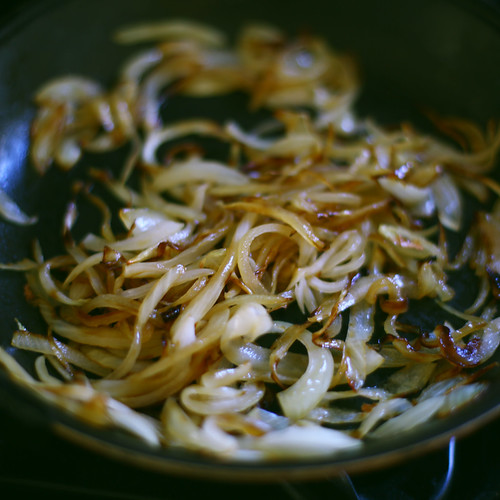To practice patience, I caramelize onions.
Caramelized onions are a delicacy well worth the wait. Not like standing outside a supposedly "amazing" brunch spot on a Saturday afternoon for two hours, only to be served soggy hash browns and half-assed rubbery eggs. Not like sitting on the SF muni for three times as long as you thought you would be and getting punched in the face and yelled at by some crazies before getting to your final destination. You see, learning patience is a work in progress.
(Don't get me wrong I do still have a soft spot for the SF muni, but I hate waiting in line for brunch.)
Luckily, those ambrosial, browned, and perfectly unctuous onions always taste as good as I remember.
The raw material you begin with, a round onion with crackly and peeling skin, keeps expectations low. An onion is a homely-looking thing, always a little dirty and rough. Very common. Used for soups and peasant stews. Sauteeing an onion is the beginning of a good stir-fry, but it's not an act that requires much thought or expertise. It's practically perfunctory.
On the other hand, caramelizing onions is a luxury, of both time and of the senses, a meditative act in the kitchen. By meditative, I mean it brings you into the consciousness of the onion, the slow gradations of its appearance and aroma as it makes contact with slow, relentless heat. Those slivers, little sunbathers basking in a shallow pan of oil.
From the beginning, the onion awakens your senses. Begin slicing the onion, and do not turn your eyes away. Wear goggles, hold a lemon in your mouth, or confront the onion head-on, welcoming the sharp and turning odor that it diffuses into the air.
Scoop up the onion slices and drop into a heated pan of oil. Turn the heat down low.
At first contact, the onion jumps and sizzles. The hot oil pricks, a tingling surprise. The onion soaks up the oil, causing its flesh to loosen up. Soon its translucence will render softness. Then it begins to sweat, releasing water, the second round of onion tears. Its aroma is now the product of tears, rather than its cause. That familiar scent, the faint sweetness of onion sweat, cues you to turn on the kitchen fan.
You will be tempted to leave the onions momentarily and attend to some less important matters, distractions. Do as you must, but beware of the onion's fragility when it is left on the stovetop unattended.
You'll return to find dark edges on your onion slices, the fire's fray, perhaps darker than what is ideal, but continue on, gently nudging the onion slivers around the pan with your spatula, pushing them from one side to another. Let your spatula tread delicately, avoiding abrupt scraping. Shriveled slivers, previously unnoticed, stick to the side of the pan.
Let the day pass by, knowing you are invested in making your kitchen a hallowed place. Turn off the kitchen lights for a moment. It is okay to let the onions caramelize silently in dark. At least see what it feels like.
You'll know when your onion slivers have browned sufficiently. They will stick together, adhered by a brown syrupy glaze. This glaze is your reward. Savor it. You began with so much and you've reduced it, from light to dark, from raw and untamed, to soft and wilty and sweet. But don't be fooled by the mere handful of caramelized onions you now have. Caramelized onions are like caviar, to be doled out in small portions, to be known and proclaimed as special. In your mouth, the taste will confirm this as true.
You've been here awhile, and now it's time to move on. Open a window, drink some water. Let the caramelized onions cool, and enjoy the steady peace that the act of caramelizing onions has washed over your entire being. It may not last for long.

Hey there! I wanted to let you know that I really like your blog and I nominated you for a Liebster Award! Check it out here: http://wp.me/p1s1hX-Kp
ReplyDelete